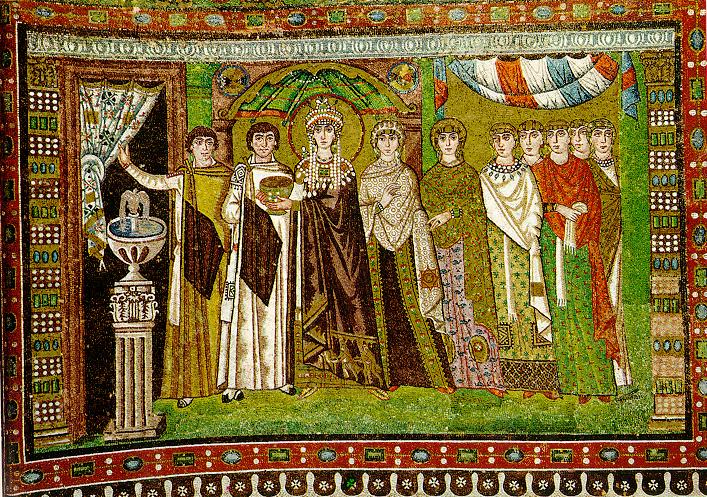This one is a little difficult to talk about because it takes place in the Byzantine empire between about 500 and 550BC. There are a few different sources, all of which contradict each other to some extent, and if I try to cover all the discrepancies we'll all be here until the next Ice Age. So! I'm going to give you a rough outline of supported facts and if you want to sort out what's up for debate, you can look into it further yourself.
Theodora was the daughter of a bear trainer (awesome) and an actress. She followed in her mother's footsteps and became an actress in Constantinople. Back in the day acting was seen as a highly disreputable career because a lot of the things acted out were sexual, and actresses doubled as prostitutes - but ones that didn't owe any allegiance to brothels and pimps, so they were more independent and better off.
When she was 16, Theodora traveled to North Africa. She settled in Alexandria for a time and converted to Christianity. When she returned to Constantinople she gave up acting and settled down as a wool spinner. She drew attention anyway - Theodora was known for her charm, wit, and likability. Somehow, she drew the attention of Justinian (heir to Emperor Justin I) and captivated him.
 |
| Justinian and his court |
Three years later Euphemia died and Justinian was as in love with Theodora as ever. So Emperor Justin I repealed the law, and the two were married. Theodora had an illegitimate daughter that may or may not have been his, but Justinian always treated the daughter as his own.
In 532 BC the Nika revolt occurred between two rival political factions named the Blues and Greens (because Romans, like sports fans, need easy identification of their teams). When the government was unable to quell the mob, they prepared to flee.
Theodora stepped up at the council and gave an impassioned speech, reminding the rulers that the people knew the difference between a government that was willing to stand and fight and one that would run away to exile. She told them that "purple makes a fine shroud", and also to stop being such wimps.
Her powerful speech swayed the council and saved Justinian's empire. He never forgot it.
Under Justinian and Theodora, Constantinople became the greatest city the world had seen up until that point. They focused on rebuilding aqueducts, bridges, and churches, and instituted social reforms that focused on equality. One of Theodora's proteges was a eunuch who became a great general later in life. She was the force behind a number of increases in women's rights, closed brothels, and banned forced prostitution. She forbade "exposing" unwanted babies to the elements, instituted the death penalty for rape, banned the death penalty for female adulterers, gave mothers guardianship rights over their children, and expanded women's rights in property ownership and divorce. She also founded a convent where ex-prostitutes could go to find work to support themselves.
 |
| Theodora and her court |
Not all Romeo and Juliet cases end in tragedy. Some end in the establishment of an empire a thousand years ahead of its time. And that is my top historical couple.
I wish I had gotten an undergraduate degree from your blog rather than my 4 year university.
ReplyDelete-BB